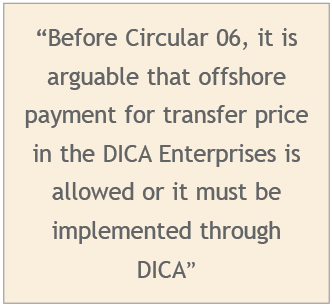Lưu ý: “bài viết này chỉ phát hành tiếng Anh cho tạp chí nước ngoài Asian- Mena Counsel”
By Phuong Phan.
In mid-2019, the State Bank of Vietnam issued Circular No. 06/2019/TT-NHNN dated June 26, 2019 (Circular 06) to provide guidance on foreign exchange management for foreign direct investment in Vietnam. This Circular shall take effect from September 6, 2019 and replace Circular No. 19/2014/TT-NHNN dated August 11, 2014 (Circular 19).
Direct investment and Capital Account
One of the noteworthy points under Circular 06 is that it clearly determines and construes foreign-invested enterprises, which are required to open the Direct Investment Capital Account (DICA), including (i) enterprises being established in the investment form of economic organisations, in which foreign investors are members or shareholders and must carry out the procedures to obtain Investment Registration Certificate (IRC) in accordance with the investment law, (ii) enterprises not subject to IRC and having 51 percent or more of the charter capital owned by foreign investors, for example enterprises having the foreign investors to contribute capital, purchase shares or portion of capital contribution to such enterprise which result in the foreign investors owning 51 percent or more of the charter capital of such enterprises (in this case the foreign investors obtained the notification on satisfaction of the conditions for capital contribution and share purchase (M&A Approval) and (iii) enterprises established by the foreign investors to implement PPP projects in accordance with the investment law (hereafter referred to DICA Enterprise).
The enterprises under (ii) and (iii) above are required to close DICA in the following cases: (i) after completing the transfer of shares, contribution capital or issuing the additional shares in order to increase the charter capital in such enterprises, the percentage of shares and contribution capital owned by the foreign investors at such enterprises is below 51 percent; or (ii) after such enterprises having become the listed enterprises with their shares listed or registered for trading on the Stock Exchange. In such cases, the non-resident foreign investors who own the shares, capital contribution in such enterprise must open the Indirect Investment Capital Account (IICA) in order to implement their revenue and expenditure transactions.

Capital contributions
One more notable point is that the foreign and domestic investors are allowed to contribute capital in Vietnamese dong or foreign currencies as provided in IRC, the establishment and operation licence under the specialised regulations (for the foreign-invested enterprises established and operated under the specialised regulations), M&A Approval, the PPP Contract signed with the competent state authorities and other evidence. This point will support the remittance banks to clarify the supporting documents provided by the foreign investor in order to allow the fund transfer without IRC requirement as usually did in the past. Thus, it being understood that in case the local enterprise which was incorporated by Vietnamese investors and then acquired by the foreign investors leading to such foreign investors owning 51 percent or more of the charter capital of such enterprise, the foreign investors should firstly obtain M&A Approval and then such enterprise opens DICA. Then the foreign investors implement the fund transfer through DICA and such enterprise will implement the procedures to recognise the foreign investors as the members/shareholders of such enterprise.
Circular 06 regulates more clearly the payment route regarding M&A transactions involving DICA Enterprise as follows: (i) the payment of transfer price between a resident investor and a non-resident investor must be implemented through DICA and in Vietnamese dong; (ii) the payment of transfer price between two non-resident investors is allowed to implement in foreign currency or Vietnamese dong and the payment of transfer price between two resident investors must be in Vietnamese dong, however, they both are not required to implement through DICA. Having said that, it seems to allow foreign investors to implement the offshore payment in foreign currency thanks to Circular 06. Before Circular 06, it is arguable that offshore payment for transfer price in the DICA Enterprises is allowed or it must be implemented through DICA.
Conclusion
In summary, Circular 06 has some significant improvements regarding capital transactions and M&A pertaining to foreign-invested enterprises in Vietnam.
https://www.inhousecommunity.com/article/vietnam-new-guidance-forex-management-fdi-enterprises/
